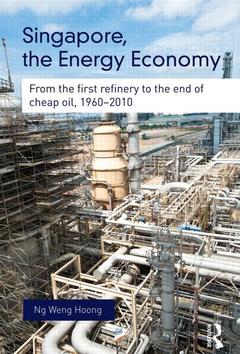Description
Singapore, the Energy Economy
From The First Refinery To The End Of Cheap Oil, 1960-2010
Routledge Studies in the Modern World Economy Series
Author: Ng Weng Hoong
Language: English
Subjects for Singapore, the Energy Economy:
Keywords
gov; ern; ment; nat; ural; gas; ser; vice; tiv; ities; Singapore International Water Week; Lib Eralization; Energy Efficiency; Jurong Island; Lo Gist Ics; Energy Sources; LNG Import Terminal; Port Authority; Chem Icals; Nova Tion; Sembcorp Marine; Natural Gas; Nat Ural Gas; Pasir Panjang; Energy Policy; Singapore's Energy; Eco Nom Ies; Peak Oil; Meg; Mono-ethylene Glycol; Eco Nomic Growth; BG Group; LNG Terminal; LNG Trading; Regasified LNG
Approximative price 64.97 €
In Print (Delivery period: 14 days).
Add to cartSupport: Print on demand
Description
/li>Contents
/li>Readership
/li>Biography
/li>
Singapore might not have survived the 1960s and prospered thereafter had it not built its economy on the foundations of oil refining, trading and support for oil and gas exploration and production. Cheap oil, sound policies and strong government combined to produce the Singapore economic miracle in its first 50 years of self-rule/independence. With the end of cheap oil, how will Singapore fare and what is the relevance of its model of development for other countries?
Singapore?s successful launch coincided with a golden period of cheap energy, and a pro-globalization and free trade environment. These three elements are now under threat from rising energy prices and the global financial crisis which started in 2007 that will leave a lasting impact on the world's political and economic landscape.
If the Singapore model is reaching or has reached its peak, what could take its place? This book poses questions for not just for Singapore planners, but also for anyone interested in modern economics and trade beyond the current era. The book also looks into the numerous subsectors within Singapore?s broad energy sector and examines the energy sector?s links with the other pillars of its economy: trade, financial, offshore/marine operations, manufacturing and transportation. It considers possible threats and challenges: Singapore?s rising energy intensity, its vulnerability to energy supply cut-offs, the likely impact of peak oil, terrorism and environmental / climate issues. It also looks at China?s growing investment and role in Singapore?s oil and gas industry. The book is a must-read for an excellent insight into Singapore?s energy economy, filled with data, information, interviews and analyses previously not available to the public.
1. Oil Refining: Launchpad of the Economic Miracle 2. The Regional Oil Trading and Pricing Centre 3. Petrochemical's Wild Ride 4. Upstream, Marine and Offshore 5. Electricity and Power 6. Natural Gas and LNG 7. Bunker and Marine Fuels 8. Sustainable Development: Clean Energy, Climate Change, Energy Efficiency, Smart Grid 9. Conclusion: The Understated Threat
Ng Weng Hoong has been a writer and analyst of global resource issues since his undergraduate days in the National University of Singapore in 1978-1981. He started off as a general news reporter in 1982 before branching out to specialize in energy issues in 1986. He has reported on a wide spectrum of issues in the energy sector, including oil, gas, coal, power, marine, renewable energy, climate change and sustainable development. His area of coverage spans Asia, the Middle East and Africa.
These books may interest you

The First Half of the Age of OilAn Exploration of the Work of Colin Campbell and Jean Laherrère 52.74 €

Peeking at Peak Oil 47.46 €


